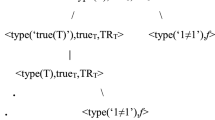Abstract
This essay attempts to give substance to the claim that the liar'sparadox shows the truth predicate to be context sensitive. The aim ismodest: to provide an account of the truth predicate's contextsensitivity (1) that derives from a more general understanding ofcontext sensitivity, (2) that does not depend upon a hierarchy ofpredicates and (3) that is able to address the liar's paradox. Theconsequences of achieving this goal are not modest, though. Perhapssurprisingly, for reasons that will be discussed in the last section ofthis essay, a natural account of the truth predicate's contextsensitivity appears to lead naturally to a version of the correspondencetheory of truth according to which the truth predicate can be understoodas a relation holding between a sentence and a salient set of contexts.The plan of this essay is as follows. Section 1 contains a generalaccount of context sensitivity. The purpose of this section is toisolate certain features of context sensitivity and formal methods oftreating them, which we will then apply to the truth predicate. Section 2then outlines two minimal conditions to be satisfied by a truthpredicate. In Section 3, I present a version of the liar paradoxthat results from these conditions and the assumption that the truthpredicate is not context sensitive in the sense described in sectionone. Finally, in section four, I provide what appear to be naturalconsequences of a truth predicate's context sensitivity. Section 4 isadmittedly speculative and points in the direction for future research.
Similar content being viewed by others
References
Aczel, P., 1988, Non-Well-Founded Sets, Stanford, CA: CSLI.
Barwise, J. and Etchemendy, J., 1987, The Liar, Oxford: Oxford University Press.
Berk, L., 2003, "Why the liar doesn't matter," J.Philos.Logic 32, 323–341.
Burge, T., "Semantical paradox," reprinted in Martin [15] Chapuis, A. and Gupta, A. (eds), 2000, Circularity, Definition and Truth, Indian Council of Philosophical Research.
Donnellan, K.S., 1997, "Reference and definite descriptions," pp. 361–382 in Ludlow (1997).
Gaifman, H., 2000, "Pointers to propositions," pp. 79–121 in Circularity, Definition and Truth, A. Chapuis and A. Gupta, eds., Indian Council of Philosophical Research.
Glanzberg, M., 2001, "The liar in context," Philos.Stud. 103, 217–251.
Grim, R. and Merrill, D., eds., 1988, Contents of Thought, University of Arizona Press.
Gupta, A. and Belnap, N., 1993, The Revision Theory of Truth, Cambridge, MA: MIT Press.
Heim, I. and Kratzer, A., 1998, Semantics in Generative Grammar, Oxford: Blackwell.
Kennedy, C., 1999, Projecting the Adjective, New York: Garland Publishing.
Kripke, S., 1997, "Speakers reference and semantic reference," pp. 383–413 in Ludlow (1997).
Ludlow, P., ed., 1997, Readings in the Philosophy of Language, Cambridge, MA: MIT Press.
Martin, R.L., 1984, Recent Essays on Truth and the Liar Paradox, Oxford: Clarendon.
Parsons, C., 1984, "The liar's paradox," pp. 9–45 in Recent Essays on Truth and the Liar Paradox, R.L. Martin, ed., Oxford: Clarendon.
Quine, W.V.O., 1960, Word and Object, Cambridge, MA: MIT Press.
Simmons, K., 1993, Universality and the Liar, Cambridge: Cambridge University Press.
Stalnaker, R.C., 1999a, Context and Content, Oxford: Oxford University Press.
Stalnaker, R.C., 1999b, "On the representation of context," pp. 96–113 in Context and Content,R.C. Stalnaker, ed., Oxford: Oxford University Press.
van Benthem, J. and ter Meulen, A., eds., 1998, Handbook of Logic and Language, Cambridge, MA: MIT Press.
van Eijck, J. and Kamp, H., 1998, "Representing discourse in context," pp. 179–237 in Handbook of Logic and Language, J. van Benthem and A. ter Meulen, eds., Cambridge, MA: MIT Press.
Wetzel, L., 2003, On Types and Tokens, Cambridge, MA: MIT Press, forthcoming.
Author information
Authors and Affiliations
Rights and permissions
About this article
Cite this article
Berk, L.A. The Liar, Context and Logical Form. Journal of Logic, Language and Information 13, 267–286 (2004). https://doi.org/10.1023/B:JLLI.0000028338.34016.2f
Issue Date:
DOI: https://doi.org/10.1023/B:JLLI.0000028338.34016.2f




